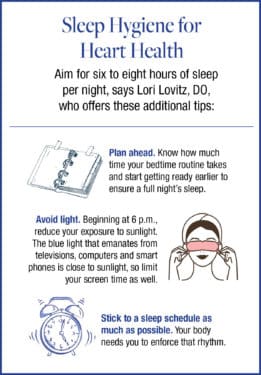Why a good night’s rest is crucial for your heart
We constantly hear about the benefits of getting a good night’s sleep. Well here’s a new one: It can reduce the risk of heart disease.
Researchers in Hong Kong and Taiwan recently published the results of an 18-year study into the connection between sleep and metabolic health. Subjects who reported getting fewer than six hours of sleep a night showed a significant risk of obesity, high blood pressure, elevated resting glucose and other components of metabolic syndrome — a cluster of conditions that can increase the risk of cardiac diseases and diabetes.
The findings are no surprise to physicians who specialize in sleep disorders, says Lori Lovitz, DO, a neurologist with NorthShore University HealthSystem’s Sleep Center. “There have been many studies that support very similar data,” she says. “What makes this study unique is that they were able to follow so many people.” For the study, the researchers looked at more than 160,000 subjects, all of whom were not overweight and were free of any major disease when the study began.
The results were important but also not a shock to cardiologist Andrew Rauh, MD, of DuPage Medical Group. It’s already known that patients with sleep apnea are prone to high blood pressure, he says. “It wasn’t a surprise to me to see that less sleep has other metabolic consequences,” he adds.
Rauh says lack of sleep leads to feelings of exhaustion, which can cause people to eat more. Overeating can lead to high glucose, high cholesterol and an increased heart rate — all conditions that put the cardiac system at risk.

When Rauh has patients who are at risk for sleep apnea, have atrial fibrillation or have high blood pressure that cannot be controlled with medications, he will direct them to undergo a sleep study. That will tell him if sleep is a factor in their cardiac conditions.
Rauh takes the link between sleep and cardiac health seriously. He asks his patients about their sleep habits. If the patient’s spouse is present, he will ask the spouse, too. “Most people don’t know if they’re a good sleeper or not a good sleeper,” he says.
Rauh also discusses sleep health with patients he is treating for heart failure or atrial fibrillation. “I tell them if they have a sleep disturbance, then their heart failure and atrial fib will be harder to treat,” he says.
Fortunately, the harmful effects of poor sleep habits on the heart can be modified, Lovitz says. “As we start improving sleep in general, we do see reductions in blood pressure and we do see better outcomes in terms of metabolic measurements.”
Rauh has seen this with his patients as well, particularly those whose atrial fibrillation is aggravated by sleep apnea. “When the sleep apnea is corrected or controlled then the atrial fib will frequently go away or be more easily controlled,” he says. “The same is true for hypertension. Blood pressure can require multiple meds to control, but when apnea is less of an issue then the blood pressure is easier to bring into range.”
So hit the sheets earlier and take care of your sleep health — your heart may depend on it.










